Publications
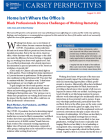
August 31, 2021
In this perspectives brief, authors John Jones and Jordan Hensley report the results of a survey that asked participants their perspectives on working from home and the impact that the death of the office could have on Black professionals’ opportunities.
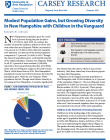
August 30, 2021
In this brief, author Kenneth Johnson reports that New Hampshire’s population grew by a modest 4.6 percent during the past decade to 1,377,500 in April 2020. In contrast, the number of minority residents, defined as those who were other than non-Hispanic Whites, increased by 74.4 percent to 176,900 in 2020.

August 20, 2021
Archived report through July 2021: With the strongest national job growth yet in 2021 and 38 states seeing statistically significant employment increases, July continued recent encouraging trends for the country’s economic trajectory. Despite this, all but two states are still short of their February 2020 employment levels. Nationally, payroll employment is still down 5.7 million jobs—a 3.7…
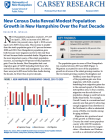
August 12, 2021
In this fact sheet, author Kenneth Johnson reports that New Hampshire’s population reached 1,377,529 on April 1, 2020, an increase of 61,000 residents (4.6 percent) since April 1, 2010 according to new 2020 Census data.
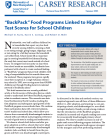
August 10, 2021
In this brief, authors Michael Kurtz, Karen Conway, and Robert Mohr summarize their recently published article at the Economics of Education Review, which aimed to understand how BackPack Programs relate to academic success.
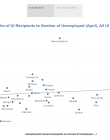
June 23, 2021
There has been substantial debate over whether higher levels of unemployment benefits have been keeping workers at home. The April and May state-level unemployment data from the Bureau of Labor Statistics offer one piece of evidence that workers are not (illegally) refusing to seek or accept employment because of unemployment benefits.
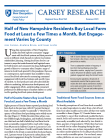
June 23, 2021
In this brief, Jess Carson, Analena Bruce, and Isaac Leslie describe data collected in the May 2021 Granite State Poll and find that while more than 80 percent of Granite Staters report buying local farm food at least a few times a month in the past year, there is significant variation in engagement across the state.
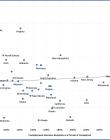
May 21, 2021
The employment data for April 2021 have elevated the question of whether the availability of unemployment benefits at higher levels during the COVID-19 economic crisis is keeping workers at home. Today’s state-by-state data release from the Bureau of Labor Statistics offers one piece of evidence that this is not the case.
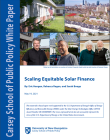
May 19, 2021
The U.S. solar photovoltaics industry has taken off over the past decade, but without deliberate action low- and moderate-income communities could be left behind in the transition to clean energy. Drawing on substantial literature related to multiple dimensions of low-income solar finance and interviews with key informants in the field, authors Eric Hangen, Rebecca Regan, and Sarah Boege…
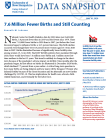
May 10, 2021
In this data snapshot, author Kenneth Johnson reports that new data for 2020 show a 3.8 percent decline in births since 2019 and the fewest since 1979. There were 16.5 percent fewer births last year than in 2007, just before the Great Recession began to influence births.
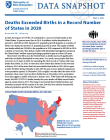
May 5, 2021
In this data snapshot, author Kenneth Johnson reports that many more deaths, fewer births, and less immigration produced the United States’ smallest percentage population gain in at least 100 years.
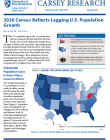
April 27, 2021
In this brief, author Kenneth Johnson reports that the first data from the 2020 Census reveal a significant slowdown in U.S. population growth.
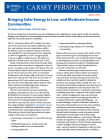
April 23, 2021
The U.S. solar photovoltaics industry has taken off over the past decade, but without deliberate action low- and moderate-income communities could be left behind.
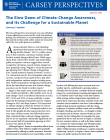
April 22, 2021
In this perspectives brief, author Larry Hamilton summarizes his research on public perceptions of climate change, drawing on a decade of nationwide and New Hampshire surveys.
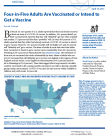
April 16, 2021
In this data snapshot, author Sarah Boege reports that by March 29, one-quarter of U.S. adults reported that they had already received at least one dose of a COVID-19 vaccine. In addition, 39.1 percent hadn’t yet been vaccinated but reported that they will “definitely” get one when available and another 17.4 percent said that they “probably” will. However, 10.1 percent of adults will “probably…
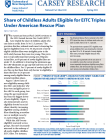
April 6, 2021
In this fact sheet, author Jess Carson explores how changes to the Earned Income Tax Credit in 2021 affect childless tax filers. Findings show that the share of childless adults who can claim a credit has tripled under the new provisions, and that the biggest driver of widened access is lowering the minimum age for eligibility.
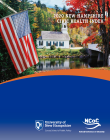
March 25, 2021
In this report, authors Quixada Moore-Vissing and Bruce Mallory build on previous Indexes published in 2006, 2009, and 2013 to take stock of New Hampshire's civic well-being in light of the changes the state has experienced in recent years. Their research draws on data from the U.S. Census, the Social Capital Community Benchmarks survey, and the UNH Granite State Poll.
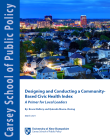
March 25, 2021
This primer offers suggestions for designing and conducting a community-based civic health index (CB Index). A CB Index allows local leaders to determine what is most important or relevant to measure in a particular town or small city and to then collect local data that reflect the specific civic activities of that community’s residents. With these data in hand, local leaders and community…
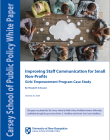
January 20, 2021
In this white paper, author Elizabeth Schwaner discusses challenges faced by Girls' Empowerment Program, a non-profit organization based in the northeast U.S. that serves at-risk girls in its community through a year-round mentoring program paired with a residential social summer camp. Despite its undeniable strengths, issues with communication are a persistent challenge. Like many small…
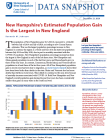
December 23, 2020
In this data snapshot, author Kenneth Johnson reports that the population of New Hampshire grew by 5,500 to 1,366,000 between July of 2019 and July of 2020, according to new Census Bureau estimates. This was the largest percentage population gain in New England.